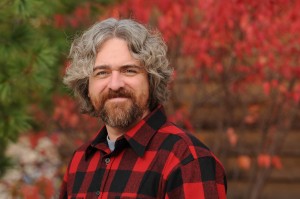| The Forestry Club and Xi Sigma Pi is hosting a firewood and Christmas tree fundrasier. Seasoned firewood will be available for $65 per face cord and will be available for pick-up or delivery (extra charge).
Christmas trees must be ordered in advance by 5 p.m., Friday, November 26, 2010. Tree pick up will be from noon to 7 p.m., Friday, December 10, or from noon to 5 p.m., Saturday, December 11, 2010 in the parking lot behind the U.J. Noblet Forestry Building off of Seventh Avenue. Tree Delivery is available for $7. For more information, or to order Christmas trees, contact Keri Deneau at kadeneau@mtu.edu |
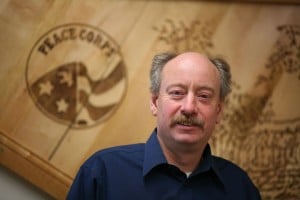
Blair Orr , director of Michigan Tech’s Peace Corps Master’s International program, was featured on an agroinnovations.com podcast, talking about the Peace Corps Master’s program at Tech, as well as changes and patterns in Third World agriculture, land tenure, low input mixed systems, increasing connectivity and migration in developing countries, the future of Haiti and strategies for promoting development in tropical agriculture. Hear the podcast at Blair Orr .
by John Gagnon, promotional writer
Will Lytle, a junior in wildlife ecology and management, slipped himself into his kayak in June at Elk Lake, Minnesota, and paddled his way down the Mississippi River, arriving in the Gulf of Mexico in August.
Since youth, Lytle, who is 20, has loved flowing water, starting with the creek in his backyard in Elgin, Illinois; so he navigated “the biggest creek I could find”–this a river that drains 31 states and two Canadian provinces. He rode old man river for 2,350 miles. “The best 54 days of my life,” he said. “It was a simple task that I loved doing. It was very in the moment.”
He went from maples to cypresses, from eagles to alligators, from 20 feet wide to a mile wide, from swamp to bayou. All over, seaweed “and its greedy tendrils,” he wrote in his journal. He sang to the cows in farm country
There was some danger: five-foot waves in Lake Winnibigoshish (he knows how to right himself should he tip over); at St. Louis, a seaplane almost ran into him. There was much discomfort: heat and mosquitoes were “unrelenting.” Near Memphis, he wrote, “I can’t make a fist or straighten my fingers.”
He was alone for the first three weeks unsupported; from the Twin Cities to the Gulf, his brother followed the bank and they saw each other in the night and in the morning. They slept in a tent, and, once in awhile, enjoyed a “real-life bed” in a motel or a garage. Three times they bathed at a car wash and got itchy from the wax in the sprayer.
Lytle endured all manner of weather: sunshine, thunder, lightning, wind and hail. “How does the wind choose where to blow?” he asked himself in his journal. “Whatever direction I’m facing,” he answered himself.
His kayak, which weighed 60 pounds and was stuffed with 100 pounds of gear, was named “She-Knows-Who-She-Is.” When it comes to that kayak, he’s like a cowboy with a good horse. “My dearest,” he wrote. “. . . You and I are one…. I would rather spend 60 days with no one else.”
Along the way there was lots of wildlife and beauty. “I captured some memories,” he wrote. There are three metropolitan areas on the river above New Orleans–Minneapolis-St. Paul, St. Louis, and Memphis–but he noted, “Ninety to ninety-five percent of the river is completely wild. It’s just trees and water.”
At night in bayou country, he was watched by alligators, their eyes glowing red in the beam of his headlamp–what locals call “Christmas lights,” he reported. He also paddled through the night by moonlight. His longest stretch of travel: 26 hours, 100 miles.
His engaging journal is both informative and fanciful: on a lean diet, he craved fat so much he drank bacon grease; in one section he took on the lingo of old pirate tales–“I lost none but me sweat and tears to feed the fishes.”
All in all, it wasn’t that hard. “I never questioned whether I’d be able to finish. There weren’t any huge, impossible roadblocks.”
The trip cost about $5,000: his savings, donations from family and friends, and sponsorships.
He was looking for “an endurance trip”; he found that, plus solitude and introspection. The best part, he said, was “being able to be alone for so long without any influences of the modern world around you.” He had some big thinks. “I solidified my understanding that I don’t understand everything yet.”
Is he good company for himself? “Some days I’m alright company. Other days it’s a trial”–indeed, this purposeful man is somewhat adrift. “I just kind of do whatever, whenever, and it’s really nice. But it’s not always going to work like that, I guess.” Partway through the trip, he started thinking about duties and responsibilities. “There is no more avoiding them,” he wrote, and he wondered whether his “poetic youth” would be over when the trip was over.
He’s unsure whether he wants a career in the military (he’s in Army ROTC) or wildlife ecology. He also has thought about becoming a priest. On the river, he said, “I prayed probably ten times a day. I would say traditional prays, like the Our Father, in rhythm with my stroke to help me get through more demanding physical portions. Other than that, I prayed in a rather unfocused, unstructured form for things like wisdom, peace and patience–instead of miles, comfort, or success.
“I’m very unhappy with my life in many dimensions,” he continued, “so my discontent drives me. I’m searching for something that will make me feel good, but also is productive and proactive–build a life that isn’t unsound.”
What’s next? He’s thinking about training for kayak racing in the 2012 Olympics. He would like to have his own TV show about adventure and nature. He wants to do something “shorter but more dangerous”–like kayak-surfing Lake Superior in a winter storm when the waves are big. (“You just seal up and go out and ride in the ice and the snow.”) He also wants to cross the open water of Lake Superior, from Copper Harbor to Isle Royale. He figures he can do the roughly 55 miles in 14 to 18 hours, weather permitting.
“All of it sounds pretty good,” he concluded, “but I just realized two days ago that I want to go to Alaska for adventures there.”
To read his journal, visit www.willbewild.com .
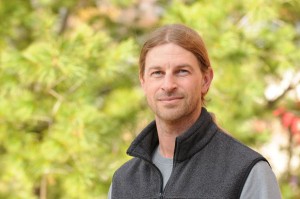 Assistant Professor Rodney Chimner and Jim Bess have received $148,650 from the US Environmental Protection Agency for a 32-month project, “Restoring Peatlands from Large Scale Ditching.”
Assistant Professor Rodney Chimner and Jim Bess have received $148,650 from the US Environmental Protection Agency for a 32-month project, “Restoring Peatlands from Large Scale Ditching.”
2002 – Tammie (Martinson) Paoli (MS) and her husband Joe (ME 2002) announce the arrival of their son, Lorenzo Louis, born September 25, 2010. Enzo joins big brother Vin, 2. Congratulations to the entire family!
| by Marcia Goodrich, senior writer
“Gentleman” Gene Hesterberg, 92, who booted more than one errant forestry student back onto the road to graduation and found jobs for countless others, died Sunday, Sept. 26, at the Delaware House of PortagePointe, where he had lived for the past two years. Hesterberg, of Hancock, came to Michigan Tech’s forestry department in 1948 and rose through the ranks of the faculty. He was named department head in 1962 and held that position until his retirement in 1981. 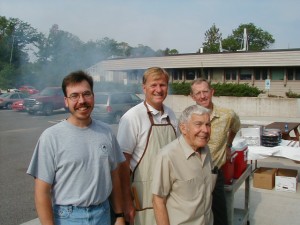 “He really was inspirational to a lot of students,” said Dean Peg Gale (SFRES). “When I talk with alumni, they tell me about Gene and the influence he had on them, not only while they were at Tech but also in their careers.” Karin Van Dyke ’78 was among them. “Gene was a big help to me and hundreds of other forestry students. He was responsible for my first job,” she said. “And he was very approachable. He had an open-door policy before open-door policies were invented. Plus, how could you not like a guy who called you ‘Pard’?” It’s even conceivable that Michigan Tech might have a different president had it not been for Hesterberg’s well-timed intervention in the career of a certain forestry undergraduate. “Gene had a gift for remembering names, and that worked really well until the student population in forestry got up to about 700,” said President Glenn Mroz. “Then it became an impossible task for even the most gifted mind. So everybody became Pard. I was, everybody was.” Hesterberg went hunting and fishing with students, as well as teaching and advising them. “As a result, he had a familiarity with students that was almost unheard of,” Mroz said. “Gene never hesitated to give anybody the Dutch uncle talk when they really needed it. As you might have suspected, I was one of those people. I had dropped out of school at one point, and Gene readmitted me. It was a couple years later that he urged me to go for a doctorate.” Hesterberg also played a key role in building the foundation of the School’s research program, Mroz said. “He was involved in research himself, and he knew that graduate studies would play a big role. So, he hired people like Marty Jurgensen and Norm Sloan to position the School for the future.” Hesterberg received the Clair Donovan Award in 1975 for his efforts on behalf of a student football player who had been injured and needed to use a wheelchair. “He put together a curriculum for him so he could finish school,” Mroz said. Among his other honors, Hesterberg received Tech’s Distinguished Teacher Award in 1980, was named a fellow in the Society of American Foresters, and was inducted into the Michigan Forestry Hall of Fame. In 1962, the Michigan Academy of Science, Arts and Letters awarded him its Academy Citation for outstanding contributions in conservation, research and teaching. He established the Gene and Margaret Hesterberg Scholarship in 1979, named for himself and his late wife, and provided a generous donation to the School to support the expansion of the U. J. Noblet Forestry Building. Hesterberg Hall is named in his honor. He was born Aug. 30, 1918, in Cincinnati and served in the army during World War II. He earned a BS from Purdue University and MS and PhD degrees from the University of Michigan, all in forestry, and was a biologist with the Michigan Department of Conservation before coming to Michigan Tech. Hesterberg was active in the community, serving on the Lake Linden Board of Education and on the Keweenaw Memorial Hospital Board. He owned a sawmill and Silver Forests, a timberland operation of several thousand acres. “He hired me in 1975, and I’ve been here ever since,” said Mary Jurgensen, the School’s scheduling counselor. “Gene was like a father to all of us. He treated us all like family, and he was so great with students, a one-man career center. He found jobs for everybody.” “People used to call him ‘Gentleman Gene,'” she said. “And he was a true gentleman. He was always thinking about the School, the students and the faculty, working hard for them. He was a great guy.” Van Dyke agreed. “He was an awesome guy,” she said. “The world has lost a great forester and a great friend.” Hesterberg is survived by his wife, Judith, of Hancock; sons William (Sharon) of Rosendale, Wis., and John (Debby) of Port Huron; and grandchildren Brian, Christopher and Katie. Services were held Tuesday at the Old Apostolic Lutheran Church in Hancock. Burial was in the Oskar Cemetery. Memorials may be given to the Alzheimer’s Association or to the Activities Fund at PortagePointe. Memorial Chapel Funeral Home in Hancock assisted with arrangements. To view the obituary or send condolences, visit the Memorial Chapel website. |
PlanetGreen.com featured an essay published by Assistant Professor John Vucetich and his colleague at Michigan State, Michael Nelson, as one of its five tips for actio n on Earth Day. See tip four at Tips .
n on Earth Day. See tip four at Tips .
| by Jennifer Donovan, director of public relations
Frank Best, a 1975 forestry alumnus and middle-school science teacher at Menominee Catholic Central, is bringing two groups of sixth, seventh and eighth grade students to Michigan Tech for a hands-on science experience on Monday and Tuesday, Sept. 13-14. On Monday, they will take a learning cruise of Portage and Torch Lake and Lake Superior on the Research Vessel Agassiz. Each group will spend two hours on Tuesday in the lab, where the students will dissect lake trout stomachs and examine the water samples they gathered under a high powered microscope. They will use a guidebook to identify the algae in their water sample. They will also study the organisms they collect from bottom samples. Using all this data, they will construct a food web of the lake. This is the fifth year that Best has brought his students to Michigan Tech. After riding on the Agassiz himself during a summer course he took at Tech on “Using Navigation to Teach Math,” he decided it would be an ideal hands-on learning experience for his students. “One of my main goals as a science and math teacher is to expose students who use math and science in their jobs,” said Best. “I want students to understand that math and science are ways of looking at our world, not just classes that you have to take in school.” The teacher said his students gain a great deal of knowledge about the Lake Superior ecosystem from their time on the Agassiz. “They also get to experience so much more than I can show them in the classroom,” he added. “They get to use state-of-the-art equipment that we can not afford at our small school.” The Agassiz will make several stops to enable the students to measure the depth, temperature and dissolved oxygen of the lakes at different depths. They will also sample the mud on the bottom of the lakes to find out what might be living down there. They will use a plankton net to capture some of the members of the plankton community. While the students are at Tech, they will also see a MSE demonstration and visit Nara Nature Park as part of a SFRES program. The Menominee students will stay at St. Anne’s church in Chassell and St. Albert the Great church in Houghton. |
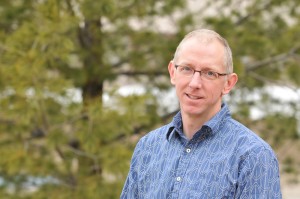 Professor David Flaspohler has received $72,512 from the National Science Foundation for the first year of a potential five-year, $349,488-project, “Interactive effects of predation and ecosystem size on arthropod food webs in Hawaiian forests fragmented by lava flows.”
Professor David Flaspohler has received $72,512 from the National Science Foundation for the first year of a potential five-year, $349,488-project, “Interactive effects of predation and ecosystem size on arthropod food webs in Hawaiian forests fragmented by lava flows.”
